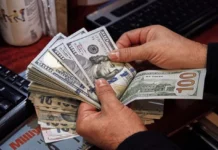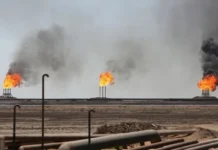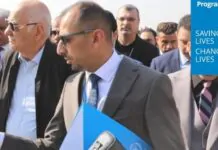Tishwash: MP calls for enacting oil and gas law to solve salary crisis
Member of the Parliamentary Oil, Gas and Wealth Committee Nazim Al-Shabli called on the federal government today, Tuesday, to expedite sending the draft oil and gas law.
Al-Shabli told / Al-Maalouma / agency, “The legislation of the oil and gas law is sufficient to solve the crisis of salaries of the region’s employees, indicating that the law contributes greatly to stopping oil smuggling as well as addressing the salary crisis.”
He added that “the salary crisis is ongoing until now and there is hope and a beginning to solve it after the legislation of the oil and gas law within the Council of Representatives,” noting that “the region continues to smuggle oil.”
He stressed “the need to expedite sending the oil and gas law to solve the giant problems between Baghdad and Erbil.” link
Tishwash: Government advisor: Financial concerns unfounded
The Prime Minister’s advisor for financial affairs, Mazhar Muhammad Salih, confirmed that the financial concerns raised from time to time about the economic situation in Iraq are “baseless.”
Saleh told {Al-Furat News} that “Iraqi diplomacy is one of the most successful in protecting the country’s supreme interests, according to the government program’s adoptions and national constants, whether with the United States or others.”
He added, “There is a high degree of consistency in managing the country’s financial affairs in a stable manner within the framework of the general economic policy, which is a positive thing that is always indicated by the ability and flexibility to confront economic challenges with high rationality during the past years.”
Saleh pointed out that “the country enjoys good financial flows from oil revenues and others, supported by efficient foreign reserves and promising economic activity in the real sector and partnership with the private sector witnessed by the country, especially in the sectors of renewable energy construction, fossil oil, electricity, gas, infrastructure, reconstruction and housing in an unprecedented manner.”
Despite the statements of government officials reassuring the financial situation in Iraq, there are some concerns that are raised from time to time due to fluctuations in oil prices.
The Iraqi economy depends heavily on oil exports, which makes it vulnerable to fluctuations in global oil prices. Any drop in oil prices could significantly impact government revenues and lead to a budget deficit.
While there are some financial concerns, the economic situation in Iraq appears stable at the moment, thanks to good oil revenues and foreign reserves at the Central Bank of Iraq. link
************
Tishwash: PM’s Advisor: Government has taken steps to revive manufacturing industry
The financial advisor to the Prime Minister, Mazhar Mohammed Salih, confirmed that the government has taken steps to revive the manufacturing industry.
Salih told the official agency: “The revival of the manufacturing industry in Iraq is a strategic issue with multiple dimensions, the first of which is that the industrial operator, whether small, medium or large, is one of the most important activities responsible for employing 60% of the workforce.”
He pointed out that “eliminating sustainable unemployment requires economic diversification, and the basics of diversification start with the industrial construction of Iraq. Secondly, the partnership with the private sector is an ideal solution for reviving the industrial sector itself, whether this partnership is in providing financing and government support or a partnership in ownership or capital.
This requires a balance between the public interest and private interests, while ensuring the existence of a transparent regulatory environment with high governance that encourages effective cooperation in an integrated social market between the two parties,” noting that “the partnership in management and ownership between the public and private sectors leads to stimulating innovation and technological development and encouraging research and development, in addition to investing in advanced manufacturing technology such as automation, artificial intelligence and 3D printing.”
He stressed that “the financing partnership represents the provision of financial support to small and medium enterprises operating in the field of manufacturing to create an optimal operating lever,” explaining that “the national development plan indicates efforts to rebuild the foundations of the manufacturing industry through real partnerships with the private sector, where the state contributes to guaranteeing sovereign financing for manufacturing industries by 85%, while the private industrial project bears 15% of the financing.”
He continued that “this financing strategy is devoted to financing industrial projects at five levels, foremost of which are projects whose products are related to construction and housing or contribute to development road works, then pharmaceutical industries, petrochemical industries, and others,” noting that “the government’s economic philosophy, in accordance with the government program, is based on the partnership between the state and the market with broad social security, and this is what makes it work according to the social market theory, which is a departure from economic liberalism and its risks.”
He explained that “Riyada Bank was established with the support of the state to provide small and medium-sized loans to young people, and this was preceded by the Prime Minister’s Riyada Initiative, which paved the way for this by providing thousands of loans to youth sectors and stimulating their innovations,” explaining that “this will lead to encouraging the country’s regulatory and investment environment and adopting policies that encourage competition, improve the business environment, and reduce bureaucratic regulations that may hinder the industrialization process and its rapid advancement.” link
************
Tishwash: Regional demonstrations: The political class lives in isolation from the suffering of the street
The wave of anger escalated in the Kurdistan Region of Iraq with the continuation of the crisis of delayed payment of salaries, which pushed thousands of employees and teachers into the streets, in protests that did not subside despite the cold weather and snowfall.
In Sulaymaniyah, where the sit-ins are concentrated, a number of protesters decided to go on a hunger strike, stressing that they will not back down until their demands are met.
A political source from Erbil said that the current crisis is not a recent one, but rather the result of political and financial accumulations between Baghdad and Erbil, as these scenes are repeated every few months without radical solutions.
He added that the partial solutions proposed after each crisis do not guarantee the stability of the financial situation of the region’s employees, which increases the state of frustration and popular resentment.
While the regional government is trying to reassure employees, security forces in Erbil continue to prevent the protests from spreading to it, as they refused to receive demonstrators coming from Sulaymaniyah. Local sources said that dozens of those who tried to organize gatherings in Erbil were subjected to security harassment, which increased tensions between the two cities.
“We don’t want slogans, we want our salaries,” tweeted a Kurdish activist on the X platform. “We don’t care about the conflict between Erbil and Baghdad, we want our children’s livelihood, which has become hostage to political differences.” In another Facebook post, a citizen from Sulaymaniyah wrote: “If we were demonstrators in any other country, we would be a global trend, but we are Kurds, so no one cares.”
Economic sources reported that the financial crisis in the region is not only a result of the delay in transferring funds from Baghdad, but also due to the lack of transparency regarding local revenues, especially from border crossings and oil revenues, the numbers of which remain vague despite the demands of the federal parliament to disclose them.
A social researcher believes that the current crisis goes beyond the economic dimension, as it represents a crisis of confidence between the Kurdish citizen and his government, as many feel that the political class lives in isolation from the suffering of the street. He added that the continued security suppression of the demonstrations may lead to a greater escalation, and perhaps to the emergence of new protest movements that are not subject to traditional political leadership.
“Every month we live with the same anxiety: When will we get our salaries? Will the high prices be enough? We don’t even have the luxury of planning for the future,” said Farid Othman, a government employee from Sulaymaniyah. “The regional government justifies, Baghdad evades, and we pay the price. How long will the citizen remain the victim?” said Shireen Abdullah, a resident.
Analysis of the situation indicates that the crisis is likely to worsen, especially if a clear mechanism is not found to ensure salary stability away from political conflicts. link





